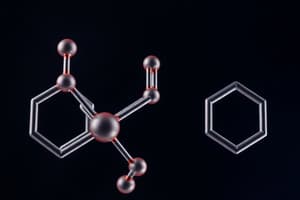Podcast
Questions and Answers
What is the primary focus of organic chemistry?
What is the primary focus of organic chemistry?
- Investigating the behavior of inorganic compounds
- Exploring the properties of non-carbon-based compounds
- Analyzing inorganic materials
- Studying the structure, properties, and reactions of organic compounds (correct)
Which elements are commonly found in compounds studied in organic chemistry?
Which elements are commonly found in compounds studied in organic chemistry?
- Oxygen, nitrogen, sulfur, and phosphorus (correct)
- Sodium, potassium, and chlorine
- Helium, lithium, and beryllium
- Iron, copper, and zinc
What does the study of organic reactions in organic chemistry involve?
What does the study of organic reactions in organic chemistry involve?
- Evaluation of physical properties of organic compounds
- Chemical synthesis of natural products, drugs, and polymers (correct)
- Analysis of non-carbon-based compounds
- Study of inorganic materials
What is organometallic chemistry focused on?
What is organometallic chemistry focused on?
What do organic compounds form the basis of?
What do organic compounds form the basis of?
What is an enol in organic chemistry?
What is an enol in organic chemistry?
What is enolate in the context of enolization?
What is enolate in the context of enolization?
What is the process of keto–enol tautomerism in organic chemistry?
What is the process of keto–enol tautomerism in organic chemistry?
What is the primary role of enols in organic chemistry?
What is the primary role of enols in organic chemistry?
What is the result of deprotonation at the α position to the carbonyl group?
What is the result of deprotonation at the α position to the carbonyl group?
Flashcards are hidden until you start studying
Study Notes
Focus of Organic Chemistry
- Organic chemistry primarily studies the structure, properties, composition, reactions, and synthesis of carbon-containing compounds.
Common Elements in Organic Compounds
- Carbon is the central element in organic chemistry, supplemented by hydrogen, nitrogen, oxygen, sulfur, phosphorus, and halogens (fluorine, chlorine, bromine, iodine).
Organic Reactions
- The study of organic reactions includes understanding how organic compounds interact, transform, and form new substances through various mechanisms and pathways.
Organometallic Chemistry
- Organometallic chemistry focuses on compounds containing metal-carbon bonds, investigating their structure, reactivity, and applications in catalysis and synthesis.
Basis of Organic Compounds
- Organic compounds are fundamental to the development of pharmaceuticals, plastics, agrochemicals, and several materials that are crucial to everyday life.
Enol in Organic Chemistry
- An enol is a compound in which a carbon atom is double-bonded to another carbon atom and has a hydroxyl group (-OH) attached to one of those carbons, typically resulting from the tautomerization of a carbonyl compound.
Enolate in Enolization
- An enolate is a reactive intermediary formed during enolization, where the α hydrogen of a carbonyl compound is abstracted, creating a nucleophilic species useful in further chemical reactions.
Keto–Enol Tautomerism
- Keto-enol tautomerism describes the reversible reaction between a ketone (or aldehyde) and an enol, demonstrating the dynamic interconversion of these two forms.
Role of Enols
- Enols play a vital role in organic chemistry as reaction intermediates and can participate in various chemical reactions, including nucleophilic addition and condensation reactions.
Deprotonation at the α Position
- Deprotonation at the α position relative to the carbonyl group generates an enolate, which is highly nucleophilic and can engage in bonding with electrophiles, facilitating carbon-carbon bond formation.
Studying That Suits You
Use AI to generate personalized quizzes and flashcards to suit your learning preferences.




